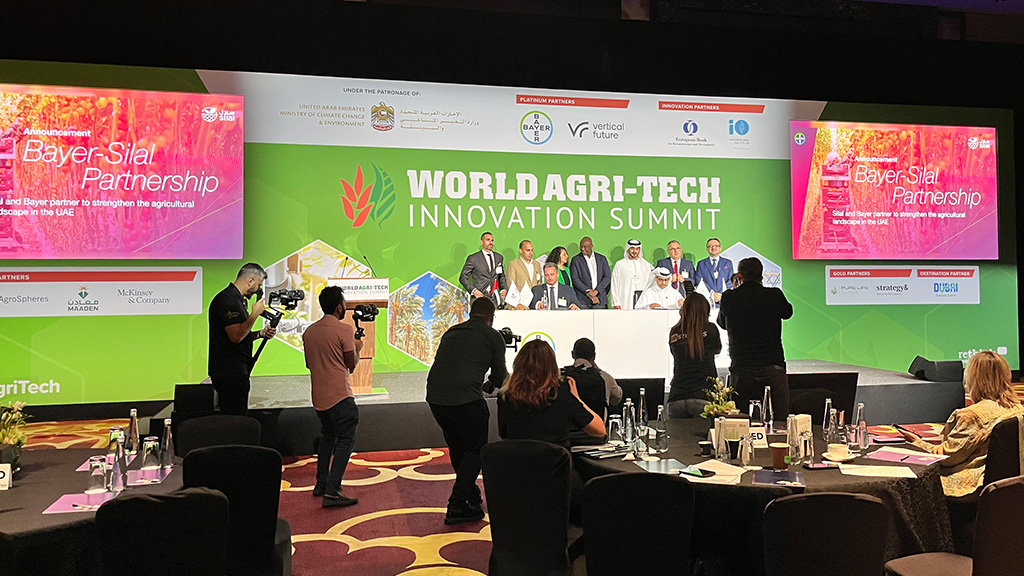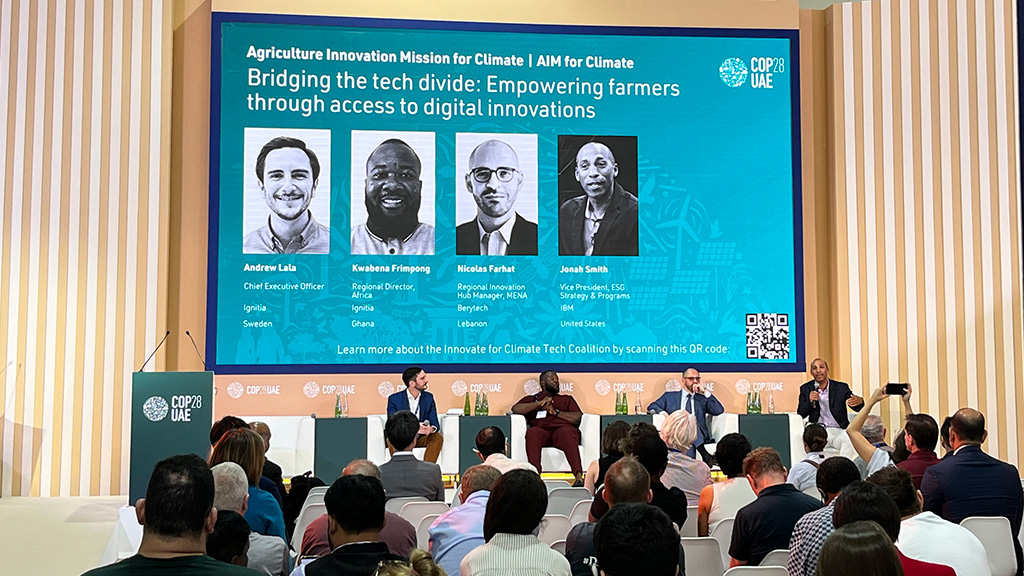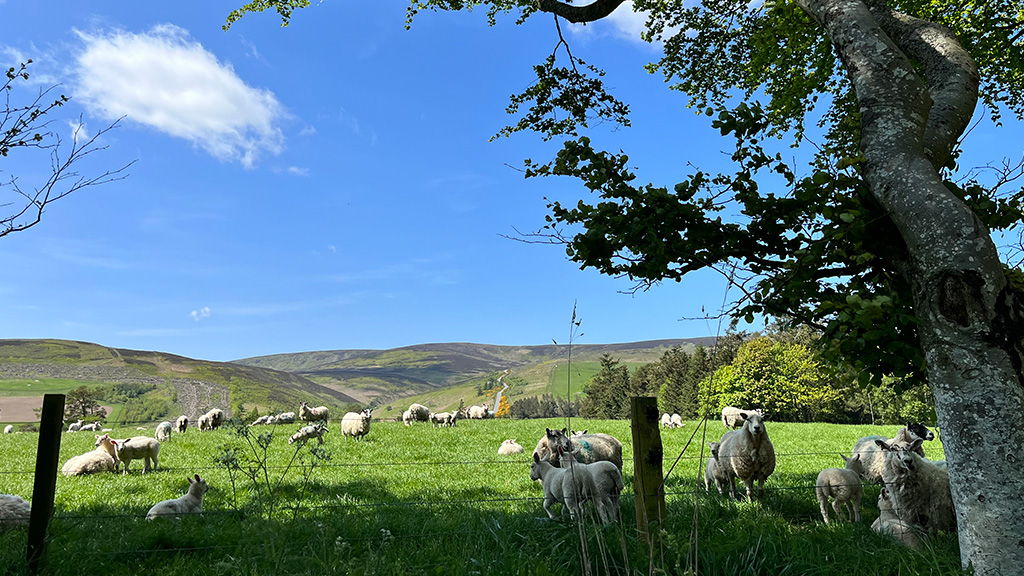
Ramin Ebrahimnejad, Business Development Manager at the Advanced Plant Growth Centre, James Hutton Limited
As the world’s attention turned to the pressing issues of climate change at COP28, particularly the critical role of agriculture and food systems, the Advanced Plant Growth Centre (APGC), supported by Scottish Development International (SDI), took a pivotal step forward. My role as Business Development Manager for APGC, situated within James Hutton Limited (JHL) – the commercial arm of the James Hutton Institute (JHI) – placed me at the heart of these discussions. Our mission was clear: to engage in the global dialogue on sustainable agriculture, showcasing APGC’s commitment to Controlled Environment Agriculture (CEA) and its potential to address climate challenges.
Our involvement at COP28 and related side events, including the World Agri-Tech Innovation Summit and the World Climate Summit, was more than just participation; it was an active pursuit of collaboration and innovation in sustainable farming practices. With the backing of SDI through the International Growth Programme, we aimed to cement APGC’s position as a leader in agricultural research and development by 2030. This journey underscored the importance of strategic engagement in global forums to enhance APGC’s contributions towards sustainable agriculture and economic viability.
This narrative is a reflection of our strategic mission to leverage emerging opportunities in agricultural innovation and funding for developing world projects, driven by the outcomes of COP28. It is a testament to APGC’s proactive approach in shaping a sustainable future for global agriculture.
In a significant move towards integrating agriculture into the global climate agenda, COP28 has highlighted the crucial role of food systems in combating climate change. The UAE Declaration on Food and Agriculture, supported by 154 countries, marks a pivotal commitment to incorporating agriculture and food systems into national climate strategies. This development signals a promising avenue for the James Hutton Institute (JHI) and the APGC to amplify their impact and harness new funding opportunities aimed at developing world projects.

“For JHI and APGC, this is a call to action to harness their research capabilities and partnerships to make significant contributions to global efforts in combating climate change and ensuring food security.”
Ramin Ebrahimnejad, Business Development Manager at APGC
A New Era for Agriculture and Climate Synergy
The declaration mandates an enhanced focus on agriculture within National Adaptation Plans (NAPs) and Nationally Determined Contributions (NDCs), offering JHI and APGC a platform to contribute their expertise in sustainable agriculture practices and controlled environment agriculture (CEA) towards achieving the Paris Agreement goals. The establishment of the Loss and Damage Fund, despite its funding shortfall, further highlights the urgent need for research and innovation in mitigating climate impacts on agriculture.
Global Goals on Adaptation: A Win for Agriculture
The inclusion of sectoral goals on agri-food systems within the Global Goals on Adaptation (GGA) marks the necessity for targeted action. This aligns with JHI and APGC’s research objectives, emphasising the importance of developing climate-resilient agricultural practices and technologies. The discussions at COP28, although leaving some issues unresolved, illuminate the path forward for agricultural innovation as a cornerstone of climate action.


Leveraging the World Agri-Tech Innovation Summit
The World Agri-Tech Innovation Summit spotlighted the strategic importance of adopting innovative solutions for climate-stressed regions. For APGC, this event was a golden opportunity to showcase its research and connect with global stakeholders in seed breeding, digital agronomy, and CEA. The summit not only bolstered APGC’s standing in sustainable agricultural technologies but also opened doors for potential partnerships and funding avenues in the MEASA region, a market ripe with investment potential in sustainable farming.

The World Climate Summit: Fostering Public-Private Collaboration
The World Climate Summit reinforced the essential role of public-private partnerships in transitioning to a net-zero emissions economy. For JHI, participation in this summit offered critical insights into global industry trends and the potential for collaboration on mitigation and adaptation projects related to agri-food systems. Engaging with global industry leaders and financial institutions at the summit enables JHI to advance its climate research and contribute to the worldwide push towards a net-zero future.
Climate Action Innovation and Organic Expo: Catalysts for Sustainable Transformation
The Climate Action Innovation Zone and the Middle East Organic and Natural Product Expo underscored the urgent need for sustainable transformation in global food systems and the burgeoning market for organic products. These events align with JHI and APGC’s research goals and highlight the importance of innovation, technology, and market trends in shaping sustainable agricultural practices.

Strategic Positioning for JHI and APGC
The outcomes of COP28 and related events present JHI and APGC with a unique opportunity to position themselves at the forefront of agricultural research and innovation, particularly in developing world projects. By focusing on areas such as speed breeding, research on novel crops, and vertical farming consultancy, JHI and APGC can leverage their expertise to address global challenges of climate change, sustainability, and food security.
Conclusions
The developments at COP28 herald a new chapter for agriculture’s role in climate action, emphasizing the need for innovative, sustainable solutions. For JHI and APGC, this is a call to action to harness their research capabilities and partnerships to make significant contributions to global efforts in combating climate change and ensuring food security. By strategically positioning themselves to benefit from the burgeoning funding landscape, JHI and APGC can play a pivotal role in shaping a sustainable future for global agriculture and food systems.
Interested in collaborating with the APGC?



